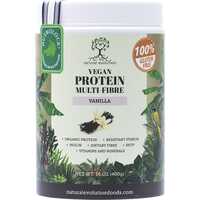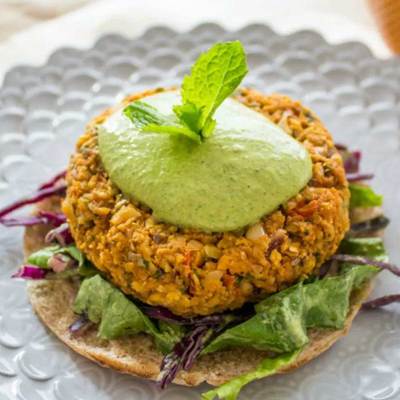If you are someone who is interested in starting a vegan diet plan, you have a lot of thinking ahead! This type of diet is great for combating disease, helping to control your body weight, and doing something great for animal-kind and the environment.
That said, if you aren’t careful with your food selections, it could leave you at risk for serious nutritional deficiencies. The fact is, we get a lot of our nutrients from animal sources. Calcium, zinc, vitamin B12, iron, and protein are all important things your body needs on a daily basis.
While you can always use a supplement to get the vitamins and minerals you need, it’s easy to overlook the necessity of protein. That is a big macronutrient that is a must-have. Without enough protein, you’ll end up losing lean muscle mass, feeling weaker than before, and may even struggle to sustain a healthy body weight.
So how do vegans get protein?
Fortunately, there are a number of vegan alternatives that you can look into and try to replace the beef, chicken, fish, and eggs that you were used to eating. So, let’s look at some of the best choices.
Chia Seeds
Your first option to replace the traditional meat in your diet plan is chia seeds. Chia seeds are a nice balanced food containing healthy omega-3 fatty acids along with dietary fibre and the protein that they contain.
Chia seeds are also a rich supply of micronutrients as they contain iron and calcium as well. Both of these are critically important for anyone who is leading an active lifestyle.
Chia seeds can be used in so many different ways – sprinkled onto a bowl of oatmeal, added to smoothies, stirred into some non-dairy yoghurt, or baked up into your favourite vegan friendly muffin mix.
Hemp Protein Powder
One terrific source of protein that all vegans should have in their pantry is a tub of hemp protein powder. This is one of the best concentrated sources of protein that vegans can use and a great way to get their protein intake up without driving their calorie level too high.
Hemp protein powder also has the added benefits of providing omega-3 fatty acids as well and since it contains no lactose, should be well tolerated by most people. If you’ve ever struggled to digest regular whey protein powder before, you’ll likely find that hemp protein powder is much easier on your body.
Hemp protein powder is also a rich source of gamma linoleic acid (GLA), which is a type of omega-6 fatty acid that is healthier than the usual omega-6 fatty acids.
These fatty acids can help to reduce the risk of diabetes and diabetic neuropathy, heart disease, high blood pressure, multiple sclerosis, obesity, PMS symptoms, and rheumatoid arthritis.
Hemp protein powder also provides a nice hearty dose of dietary fibre as well, which is another factor that sets it apart from most other protein powders out there.
You can use hemp protein powder in much the same way you would use any other protein powder, adding it to smoothies, baking with it, stirring it into oatmeal, or just drinking it as-is or with some unsweetened vanilla almond milk if you prefer.
Spirulina Powder
Along with hemp protein powder, check out spirulina powder. This is actually a superfood, a blue-green algae that is not only rich in protein but also offers a wide array of important health benefits.
First, it helps to detoxify the body, removing heavy metals and arsenic from your system. It’s also great for reducing the risk or symptoms associated with candida and may reduce the risk of cancer. Studies have also shown that spirulina can improve your overall immune system, thus positioning you in a better place to fight off disease and illness.
It’s also a great superfood for helping to lower blood pressure levels and reduce cholesterol, while also decreasing your overall chance of having a stroke.
You’ll also get a very good dose of vitamins A, K, B12, iron, manganese, and chromium when you take this powder. Iron is especially notable as many vegans tend to fall very low in this mineral since the other primary source of iron is red meat.
Almond Butters
One delicious protein alternative to meat that you’ll definitely want to take advantage of is almond or nut butter. Almond butter is a great tasting spread that can be used in so many different ways and because it has a nice mild flavour, it’s liked by just about everyone.
Almond butter does provide a good dose of dietary fat as well, so note that you’ll probably want to count one serving as both a fat and a protein in your diet plan. The good news is the fat found in almond butter is the unsaturated variety and is going to do a very good job at promoting heart health and lowering your cholesterol levels.
Almond butter doesn’t contain too many additional carbohydrates either, so this makes it a great choice for those who may be using a reduced carb diet plan.
Protein Bars
Finally, if you need protein on the go, nothing will work better than an assortment of protein and/or energy bars. For example, Clif Bars supply a great mix of protein, carbohydrates and dietary fats and are completely dairy-free and vegan friendly.
They come individually packaged, so all you need to do is grab one to go and you have the perfect snack on your hands for those extra busy days.
Do keep in mind however that these are meant to supplement your regular diet plan, not replace whole meals. They are fine to have as a snack once or maybe even twice per day if you’re especially active, but they should not be used as a substitute to a wholesome breakfast, lunch, or dinner meal.
So there you have the best protein alternatives to eating meat that you should be considering. If you can focus on getting these into your diet plan, you shouldn’t have too much trouble getting your protein needs met and seeing all the great results a vegan diet has to offer.
...and remember, qualified nutritionists at Healthy Being are available to offer further general advice to help guide you in selecting the right products. So please, feel free to contact us at any time!
 Dr Peter Succar heads up the Product Research Team at Healthy Being and is an enthusiastic Health & Fitness Lifestyle Coach. He's passionate about helping others obtain optimum health, advocating realistic and achievable changes in diets and lifestyles that promote the body’s natural immunity, its ability to self-heal and achieve overall mental and physical well-being.
Dr Peter Succar heads up the Product Research Team at Healthy Being and is an enthusiastic Health & Fitness Lifestyle Coach. He's passionate about helping others obtain optimum health, advocating realistic and achievable changes in diets and lifestyles that promote the body’s natural immunity, its ability to self-heal and achieve overall mental and physical well-being.


 Certified Organic
Certified Organic Vegan Friendly
Vegan Friendly  Vegetarian
Vegetarian Organic Ingredients
Organic Ingredients Dairy Free
Dairy Free Gluten Free
Gluten Free Keto Friendly
Keto Friendly






























